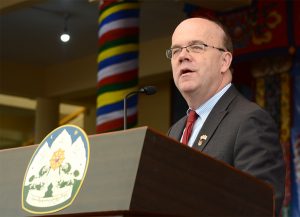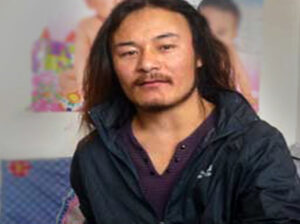
Photo: Tenzin Phende/DIIR
Speaking on the floor of the United States House of Representatives on January 31, Congressman Jim McGovern from Massachusetts raised the issue of suppression of religious freedoms by the Chinese government and made specific reference to the ongoing situation at Larung Gar in Tibet, a Buddhist institute which was possibly the largest religious institution in the world.
The Chinese government has been interfering in activities at Larung Gar for many years. Monks and nuns are frequently expelled for extended periods, ostensibly for rebuilding parts of the institute. There have also been reports of the Chinese government offering cash rewards of up to $20,000 (£14,000) to any monks or nuns who agree to leave the institute. Human Rights Watch recently reported that 200 Communist Party cadres and lay officials were “taking over all management, finances, security, admissions, and even the choice of textbooks” there. Under this new management, 40% of the classes taught at the institute will now be on politics and other non-religious subjects. The primary criterion for accepting students now is reported as being whether they “have a firm political stand
, accepting the Great Motherland, the Chinese people, Chinese culture, the Chinese Communist Party and socialism with Chinese characteristics.” Political compliance by monks will be rewarded with public praise and titles such as “model patriotic monk.”
McGovern condemned these actions and referred to them as “draconian”. He continued: “China says it respects constitutionally protected religious beliefs: that is a lie. When the state puts officials who are required to be atheists in charge of your religious institution, that is not religious freedom. When admission requires a firm political stand when the state tells you what to teach and students must honour the communist party that is not religious freedom.”
McGovern, the author of the Reciprocal Access to Tibet Act of 2017, said that if the Trump administration does not act, then Congress must ensure that China faces consequences for its “egregious actions to control and destroy Tibetan Buddhism.”
In an article published in December 2017, the Chinese state media Xinhua claimed that the changes taking places in monasteries across Tibet were necessary to improve conditions for the monks and nuns living in them. The article refers to $30 million (£21.5 million) that has been spent renovating Drepung monastery over the last five years. “Tibet started providing funds to monasteries in 2011,” the article states, “supplying them with electricity and water, and building roads, bath houses, greenhouses and garbage treatment facilities.” The article quotes a few monks who speak favourably of the changes. Of the newly appointed administrators, Ngawang Gonchen, a monk, is quoted as saying: “These officials are like a family member to us. Whenever we have a problem, we will look for their help.”




 Print
Print Email
Email